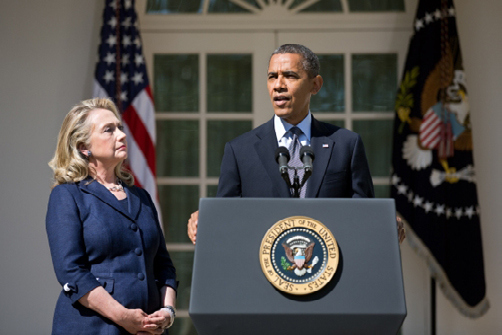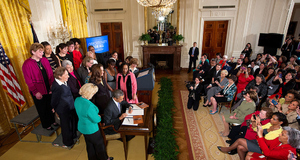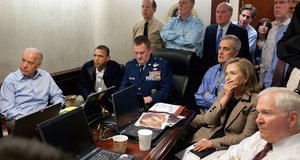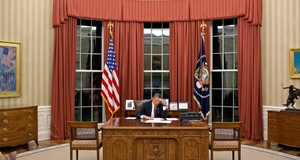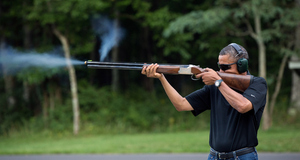From Cornell International Affairs Review VOL. 6 NO. 2Barack, Benghazi, and Bungles: Tracing the Obama Administration's Handling of the Benghazi Attacks
IN THIS ARTICLE
KEYWORDS
On the night of September 11th and the morning of September 12th, 2012, armed militants stormed the United States' consulate in Benghazi, Libya, and also attacked a nearby CIA annex. These attacks led to the death of four Americans, and ten more Libyans and Americans were injured. Among the dead was U.S. Ambassador to Libya, Christopher Stevens. In the months following the Benghazi attacks, great political controversy has surrounded these events. One of the most contentious debates regards the Obama administration's handling of the attacks, in light of the 2012 presidential election. In this essay, I hope to trace the evolution of these debates, paying particular attention to the narratives given, both by the Obama administration and the intelligence community, to explain the identities and motivations of the Benghazi attackers. By bringing attention to the administration's investigations, handling of the press, and interbranch relationships following the Benghazi attacks, we may be able to determine whether the Obama administration's responses to the Benghazi attacks were riddled with cognitive bias and an intentional obfuscation of the facts. By reviewing the speech and activity of highlevel members of the Obama administration, we can better mediate claims that a president on the campaign trail misled the American public and undertook misguided attempts to make this foreign policy debacle go away. Immediately after the attacks took place, the world was wondering who was responsible for them and what motivated the attackers. Forced into answering these two questions, the Obama administration struggled to appease the American people, as well as Congress, about the true nature of the Benghazi tragedy. I. Initial Responses: September 12 - September 19Speaking in the Rose Garden on September 12, 2012, President Obama referred to the Benghazi attacks as "acts of terror."3 Speaking on the same day, U.S. Secretary of State Hillary Clinton echoed President Obama's remarks, adding that the administration was not certain about all of the details, or levels of planning, behind the attacks: "We are working to determine the precise motivations and methods of those who carried out this assault."4 However, the administration did produce an official stance concerning the catalyst behind the attacks: "Administration spokesmen, including White House spokesman Jay Carney, citing an unclassified assessment prepared by the CIA, maintained for days that the attacks likely were a spontaneous protest against an anti-Muslim film instead of a concerted military attack perpetrated by extremists affiliated with powerful local and international terrorist groups."5 The anti-Muslim video, entitled Innocence of Muslims, had incensed multitudes worldwide, but was met with a particularly virulent response in the Middle East. Even a cursory review of recent Libyan history makes the administration's initial stance on Benghazi appear reasonable. In the years leading up to the Benghazi attacks, perceived slights against Islam had spurred several instances of violence in Libya: "a 2006 assault by local Islamists that had destroyed an Italian diplomatic mission in Benghazi over a perceived insult to the prophet… In June, the group [Ansar al-Sharia] staged a similar attack against the Tunisian Consulate over a different film, according to the Congressional testimony of the American security chief at the time, Eric A. Nordstrom."6 In his press briefing on September 14th, Jay Carney followed the company line, harping incessantly on Innocence of Muslims, which Carney communicated as the reason behind the violence in Benghazi: "It is in response not to United States policy, not to obviously the administration, not to the American people. It is in response to a video, a film… that is offensive to Muslims."7 Throughout the press briefing, Carney's responses to Benghazi questioning reflect a strong sense of campaign awareness. The White House Press Secretary defended against the Romney camp's criticisms of President Obama's preparedness and response to Benghazi, and Carney added that Obama has a better relationship with the "Muslim World" than when he entered office.8 In the days immediately after the Benghazi attacks, tentative initial reports offered from intelligence agencies, such as the CIA, became low-hanging fruit for those intent on criticizing the Obama administration. When U.S. Ambassador to the United Nations Susan E. Rice went on early morning talk shows on September 16th, she responded to Benghazi questions with the official CIA talking points: "The currently available information suggests that the demonstrations in Benghazi were spontaneously inspired by the protests at the U.S. Embassy in Cairo and evolved into a direct assault against the U.S. Consulate and subsequently its annex. There are indications that extremists participated in the violent demonstrations."9 As Rice would soon learn, the assessments offered to the public by White House officials, State Department leaders, and intelligence officers were at odds with the views of high-ranking officials of the Libyan government, as well as some members of the United States government. President Obama delivering his statement on the Benghazi attacks from the Rose Garden of the White House By September 13th, anonymous State Department officials were communicating to the press that the Benghazi incident was a "clearly planned attack," not a spontaneous response to Innocence of Muslims.10 A political chicken-or-the-egg problem arose, as Americans witnessed contradictory Benghazi narratives and did not know who was to blame: politics or the intelligence community. Were American intelligence agencies suffering from poor data gathering procedures? Were clashing political entities manufacturing divergent claims in order to achieve partisan gains? Or did the immediate politicization of the Benghazi events inappropriately pressure the intelligence community into supplying incomplete statements, with the understanding that further updates were on their way? The CIA insisted that immediately following the attack, its agents were collecting evidence that showed both spontaneity and planning—with perpetrators described as a "flash mob with weapons" who displayed "some pre-coordination but minimal planning"—but politicians and the American public were clamoring for a tidier description.11 In the beginning, the National Counterterrorism Center's assessment aligned with the data being provided in unclassified CIA and FBI reports. The NCC report from September 14 states: "As time progresses, we are learning more, but we still don't have a complete picture of what happened… At this point, we are not aware of any actionable intelligence that this attack was planned or imminent. . . . We are very cautious about drawing any firm conclusions at this point with regard to identification and motivation of the attackers."12 However, on September 19th, Matthew Olsen, the Director of the NCC, told the Senate Committee on Homeland Security and Governmental Affairs that the Benghazi incident was a thought-out terrorist attack, likely perpetrated by individuals linked to alQaeda or al-Qaeda in the Islamic Maghreb.13 Matthew Olsen's admission, coming more than one week after the Benghazi attacks, stood as the first statement made by a member of the Obama administration or a representative of the U.S. intelligence community that formally deemed the Benghazi incidents to be terrorist attacks. II. Change of Course: September 20 – November 6Late September erupted with political controversy due to Olsen's new testimony regarding Benghazi. For more than a week, several awkward situations arose wherein a Libyan government representative would publicly renounce the Benghazi terrorist attacks, just so an American official could follow up by denouncing Innocence of Muslims, while refusing to speak about the level of planning or nature of the attacks. Political conservatives had argued since the beginning that "the White House knew on day one that al-Qaeda terrorists were responsible,"14 but that did not stop President Obama from maintaining his initial viewpoint about a spontaneous-protest-turned-violent. Was the president intentionally misleading the American people? On the evening of September 18th, just a day before Olsen's remarks to the Senate, Obama appeared on The Late Show with David Letterman and reaffirmed that the Innocence of Muslims YouTube video was used as an excuse for Benghazi extremists, but the president did not refer to the events in Benghazi as planned terrorist attacks.15 In the days immediately after the Benghazi attacks, tentative initial reports offered from intelligence agencies, such as the CIA, became low-hanging fruit for those intent on criticizing the Obama administration On September 20th, the day after Olsen's testimony, White House Press Secretary Jay Carney referred to the Benghazi tragedy as a terrorist attack for the first time.16 Secretary of State Clinton followed suit the next day.17 That week, the Secretary of State—along with Deputy Secretary of Defense Ash Carter, Director of National Intelligence James Clapper, and Joint Chiefs Vice Chairman Adm. Sandy Winnefeld—provided a classified briefing to the Senate on the Benghazi attacks.18 This briefing, one of the first between the State Department and the federal legislature, was viewed as "useless, worthless" by several prominent Senators, who complained that the Obama administration had furnished no answers or investigation updates.19 One Republican Senator referred to the cagey briefing as a "onehour filibuster."20 For some, the Benghazi attacks represented yet another example of the poor working relationship between Congress and the Obama administration. For others, the tension between Congress and the Obama administration over Benghazi embodied a unique case of the administration striving to push an incident onto the political backburner for campaign reasons, even as Congress— and the American public—demanded greater attention on the matter. Americans witnessed contradictory Benghazi narratives and did not know who was to blame: politics or the intelligence community One fact is clear: President Obama was remarkably hesitant to publicly label the Benghazi events as terrorist attacks, even after the president of Libya, Secretary of State Clinton, White House Press Secretary Carney, and numerous officials from the intelligence community had claimed the events to be terrorist attacks. However, it was not until the end of September that President Obama called the Benghazi events terrorist attacks. Even on September 12th, the day that he referred to the Benghazi attacks as "acts of terror," President Obama told CBS reporter Steve Kroft that "it's too early to know" whether the attack constituted a terrorist attack.21 Throughout September, Obama consistently deflected opportunities to label or elaborate on the nature of the Benghazi attacks, with the president instead routinely claiming "we're still doing an investigation."22 However, it is hard to believe that this sluggishness was an act of political gamesmanship on the part of the campaigning Obama because, by late September, the president's unwillingness to refer to the Benghazi events as acts of terrorism became a rallying cry for the Romney camp, which was trying to disabuse voters of their strong faith in Obama's foreign policy leadership.23 Obama must have been aware that American intelligence agencies' investigations were slow to get underway. Even two weeks after the attack, FBI investigators were not allowed in Benghazi, the crime scene hadn't been secured, and "the FBI's request to directly question individuals who Libyan authorities have in custody was denied."24 It ended up taking FBI investigators three weeks to arrive in Benghazi, and once investigators were in the city, they only stayed for four and a half hours.25 Unfortunately, the investigation process has been plagued by more than its unbelievably late start. The administration urged intelligence agencies and law enforcement groups to "work not only with Libya but with other nations in the region to investigate the attack," which meant a lengthy investigation process—helping to push determinate and public results outside of election season.26 However, according to some intelligence sources, the methodical and cooperative investigation process can be explained by agencies simply "want[ing] to be cautious about pointing fingers prematurely," especially after the conflicting nature of early intelligence.27 On September 26th, Libyan President Mohamed Magariaf reiterated his initial statement that the "preplanned act of terrorism" in Benghazi was committed by "Al-Qaeda elements who are hiding in Libya."28 Speaking at a United Nations meeting on the same day, Secretary of State Clinton agreed in part with the Libyan president, suggesting that the attacks were linked to Al-Qaeda in the Islamic Maghreb (AQIM).29 Of course, administration officials later added that "the question [of AQIM involvement] would be officially settled only after the F.B.I. completed a criminal inquiry, which could take months."30 Answers would not be coming any time soon, although The New York Times reported that, as of October 15th, intelligence officers had still found "no evidence of planning or instigation by the group."31 Was the president intentionally misleading the American people? Public unease and mistrust in the Obama administration to provide honest answers intensified in October. In a CNN interview on October 15th, Secretary Clinton attempted to defend the administration by arguing that the "fog of war" had led the administration to reach incorrect early assessments of what happened in Benghazi and what motivated the attackers.32 On October 23, emails sent from the State Department Operations Center to "State Department, Pentagon, the FBI, the White House Situation Room and the office of the Director of National Intelligence" on the day of the Benghazi attacks came to light.33 Some politicians and newspapers have argued that these emails show that the president immediately understood that the attacks were preplanned and committed by terrorists, yet he kept this information quiet. However, administration officials have responded, saying that the sole email which offered a possible link to terrorist activity was "an unclassified ops alert email, not a vetted intelligence assessment" and was not as reliable as the intelligence assessments given to the White House in the days after the attacks.34 Regardless of the supposed disparity in intelligence reliability, the fact remains that the Obama administration immediately was made aware of State Department intelligence that offered evidence of a planned terrorist attack, a description that later proved to be the official intelligence community narrative.Continued on Next Page » Suggested Reading from Inquiries Journal
Inquiries Journal provides undergraduate and graduate students around the world a platform for the wide dissemination of academic work over a range of core disciplines. Representing the work of students from hundreds of institutions around the globe, Inquiries Journal's large database of academic articles is completely free. Learn more | Blog | Submit Latest in International Affairs |


